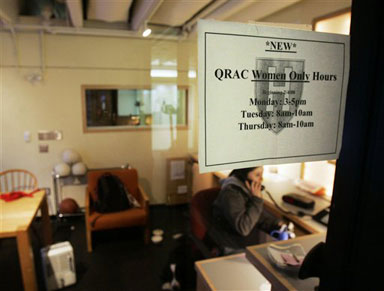
In a test of Harvard’s famed open-mindedness, the university has
banned men from one of its gyms for a few hours a week to
accommodate Muslim women who say it offends their sense of modesty
to exercise in front of the opposite sex.
In a test of Harvard’s famed open-mindedness, the university has banned men from one of its gyms for a few hours a week to accommodate Muslim women who say it offends their sense of modesty to exercise in front of the opposite sex.
The policy is already unpopular with many on campus, including some women who consider it sexist.
“I think that it’s incorrect in a college setting to institute a policy in which half of the campus gets wronged or denied a resource that’s supposed to be for everyone,” said student Lucy Caldwell, who also wrote a column in The Harvard Crimson newspaper critical of the new hours.
Student Ola Aljawhary, who is Muslim and works out elsewhere on campus but is not one of the women who requested the change, rejected that argument.
“The majority should be willing to compromise,” she said. “I think that’s just basic courtesy. We must show tolerance and respect for all others.”
The trial policy went into effect Feb. 4, about a month after a group of six Muslim women, with the support of the Harvard College Women’s Center, asked the university for the special hours, spokesman Robert Mitchell said.
“We get special requests from religious groups all the time and we try to honor them whenever possible,” he said, noting that the school has designated spaces for Muslim and Hindu students to pray.
No men are allowed in the gym between 3 p.m. and 5 p.m. on Mondays, and between 8 a.m. and 10 a.m on Tuesdays and Thursdays. Even the staff during those times is all women.
The special hours allow the Muslim women, who adhere to traditional dress codes by covering their hair and most of their skin while in public, to dress more appropriately for exercising, said Susan Marine, director of the women’s center.
“It’s a pretty big breach of their moral and religious code for a man to see them with their hair uncovered and it’s just not possible for them to be in a mixed environment,” she said.
When student Kareem Shuman showed up to work out at the gym on Monday, he was turned away but didn’t mind.
“Knowing it was requested by women of my faith – it’s very understandable to me,” said Shuman, 21, who figured he’d just come back later for his workout.
Other men find the new hours inconvenient. Nick Wells, a junior who wrote an opinion piece in the Crimson criticizing the policy, suggested setting aside one room for women.
“It’s not that I am opposed to the idea of helping people in religious groups or women in general, but I just think Harvard is not being fair to people like me who live (near the gym),” Wells said in an interview.
The policy only applies to one gym, a facility mainly used for intramurals. Because of its location at the edge of campus, it is the university’s least used gym, Mitchell said.
The women-only hours are of minimal inconvenience because they are just six out of the 70 hours a week the gym is open, Marine said.
“Harvard has a moral and ethical responsibility to make sure our students can stay healthy,” she said.
An Associated Press reporter who went to the gym Monday did not see any Muslim women entering. Efforts to reach some of the women who requested the policy through the Women’s Center were unsuccessful.
The policy will be reviewed at the end of the semester, Mitchell said.
Kent Blumenthal, executive director of the National Intramural-Recreational Sports Association, which has 660 member colleges and universities nationwide, said he could not think of any other institution with a similar policy.
“It seems in some ways contrary to the purpose of campus recreational programs, which is all about access,” he said.
Harvard’s policy is no different from commercial gyms that cater partially or even exclusively to women, said Ibrahim Hooper, a spokesman for the Washington-based Council on American-Islamic Relations.
“The Muslim bashers portray it as the world coming to end, but if women have a couple hours a week to work out in private, I don’t see it as a major issue,” he said.








